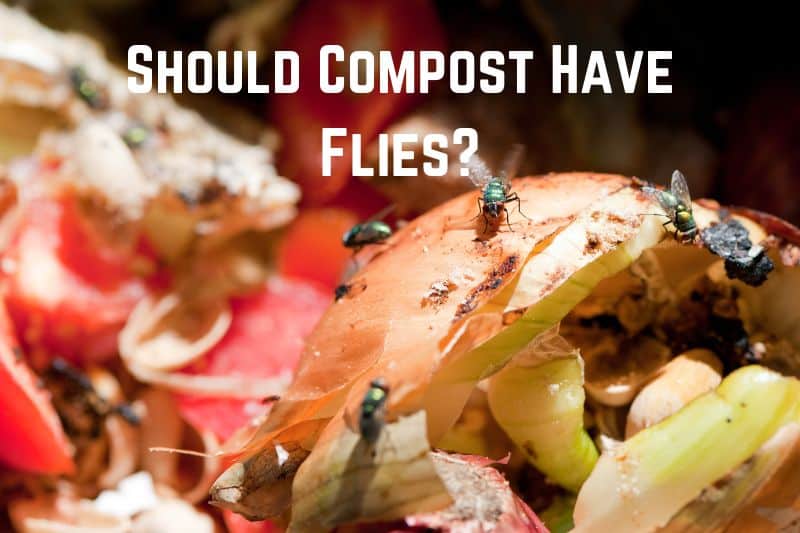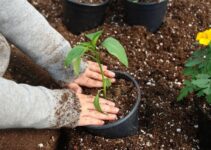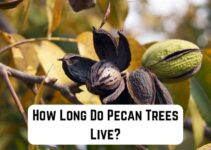Composting through regulated, aerobic decomposition transforms organic matter into a mulch or soil supplement rich in nutrients. Compost is the final result of this process.
Food waste composting minimizes methane production, frees up landfill space, and provides fertilizer for the garden. However, if you are not cautious, it can also draw pests. Unfortunately, there is a gross side to gardening and composting, which frequently manifests as maggots and insects in the compost.
It makes sense to wonder whether there should be plenty of flies in your compost, considering it is full of rotten vegetable matter, manure, and kitchen waste. Let us dive into the answer to this question and understand all about composting flies.
Should You Have Flies in Your Compost Heap?
It’s natural to see some flies around your compost heap, especially during warm weather. Flies are attracted to the decaying organic matter in your compost. While it’s not ideal to have a large number of flies buzzing around, it’s not necessarily a bad thing. In fact, some flies can be beneficial to the composting process.
Fruit flies and houseflies are the most common flies you’ll find around your compost. They help break down the organic matter faster, accelerating the composting process. Their larvae feed on the decaying material in the heap, assisting in decomposition.
However, too many flies can become a nuisance, especially when they invade your living spaces.
To keep fly populations under control, you can take a few simple steps:
1. Bury fruit and vegetable scraps. When you add fresh kitchen waste to your compost, make sure to bury it under a layer of dry, brown materials like leaves or straw. Flies are less likely to lay eggs and thrive in a well-covered pile.
2. Maintain a balanced compost. A healthy compost heap consists of green and brown materials. Green materials, such as grass clippings and kitchen scraps, provide nitrogen, while brown materials, such as leaves and cardboard, provide carbon. A good balance of these materials will help reduce odors attracting flies and speed up decomposition.
3. Turn your compost regularly. Turning your compost heap regularly ensures aeration, which promotes decomposition and controls odors. This will help discourage flies from laying eggs in the pile.
4. Use a compost container or bin. If your compost is in an open heap, consider switching to a closed container or bin with a lid or cover. This will make it harder for flies to access the compost.
Flies and Composting
Types of Flies in Compost
When dealing with compost, you may encounter different types of flies. The most common ones are fruit flies and fungus gnats.
Fruit flies are usually attracted to the sweet smell of decomposing fruits and vegetables. They reproduce quickly, but they are harmless to your compost.
Fungus gnats, on the other hand, thrive in damp environments where they lay eggs in fungi and decaying organic matter. They can be beneficial in breaking down the compost material, but they can become a nuisance in large numbers.
Role of Flies in Composting
Flies do have their role in the composting process. Both fruit flies, fungus gnats, and their larvae help break down organic matter. They speed up decomposition and contribute to a healthy, well-balanced compost.
However, many flies can indicate an imbalance in your compost. Too many flies may suggest that:
- Your compost is too wet
- There is an overabundance of food scraps (specifically, fruits and vegetables)
- Proper layering has not been maintained
To maintain a balance in your compost and keep flies to a minimum, you should:
- Turn your compost regularly: This increases aeration, reduces moisture, and disrupts the breeding ground for flies.
- Maintain layers: Alternate between adding green (nitrogen-rich) and brown (carbon-rich) materials to balance the moisture and provide adequate nutrients for decomposition.
- Bury food scraps: When adding food waste to the compost, dig a small hole to bury them. This will make it less accessible for flies and reduce smell.
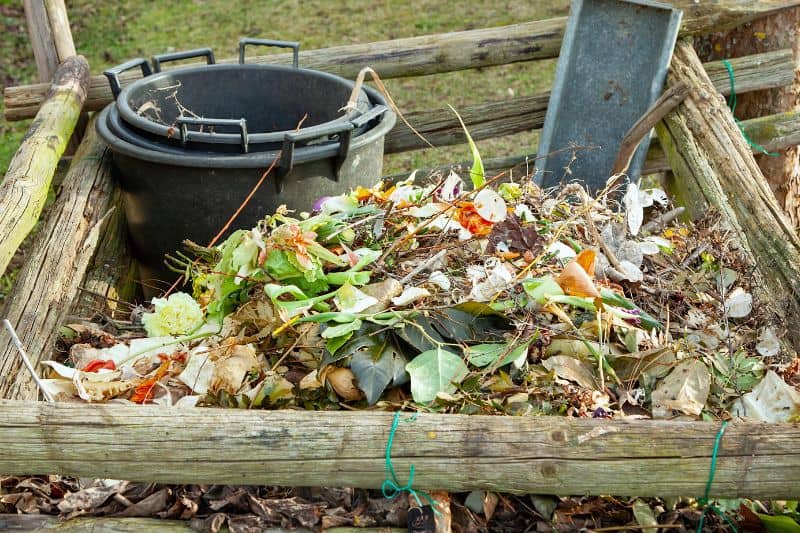
What in Compost Attracts Flies?
When you’re maintaining a compost pile, it’s quite common to notice flies around it. There are a few reasons that flies are attracted to compost. Understanding these factors can help ensure your compost is as healthy and productive as possible.
Firstly, moisture is a key factor that attracts flies to compost. Flies need moisture to lay their eggs and for their larvae to survive, so a damp compost pile provides an ideal environment for these insects. To keep your compost well-balanced, it’s important to regularly turn the pile and ensure that it doesn’t become overly wet.
Next, the smell of decomposing organic matter is another thing that draws flies to your compost. Odors from fruit scraps, vegetable peels, and other decaying kitchen waste can attract various flies, like fruit flies and houseflies. To reduce the odors that attract flies, add a layer of brown material like leaves or straw over the green kitchen waste.
Finally, the presence of larvae in the compost can also attract more flies. Flies, such as the black soldier fly, are actually beneficial to the composting process as their larvae help break down the organic material faster.
However, like houseflies, other flies are less desirable because they can carry diseases. To minimize the number of flies in your compost, bury fresh food scraps under existing compost and maintain a balanced ratio of green to brown materials.
Pros and Cons of Having Flies in Compost
Pros:
- Natural decomposers: Flies, especially the larvae of certain species, are known as efficient decomposers. These creatures can quickly break down organic matter, accelerating the composting process.
- Aeration: As flies and their larvae crawl through the compost, they create tiny tunnels. These tunnels help to aerate the pile, which is essential for maintaining the right balance of oxygen for the microorganisms that break down the materials.
Cons:
- Pest attraction: One of the most significant drawbacks of having flies in your compost is that they can attract other pests. These pests may cause damage to plants and also spread diseases.
- Unpleasant odors: Flies can sometimes lay eggs in the compost pile, leading to the development of maggots. Maggots are known to produce a strong, unpleasant smell that many find repulsive.
- Disease transmission: Some species of flies can carry diseases and pathogens that may harm humans and pets. While this is rare in compost piles, taking precautions to minimize the risk of disease is still essential.
To mitigate the cons and reap the benefits of having flies in your compost, consider implementing some measures, like turning your compost regularly and placing a layer of soil or other materials on top of the pile. This can help to control fly populations, reduce odors, and prevent pest infestations while promoting healthy decomposition.
Does Composting Reduce Food Waste?
Twenty-five to fifty percent of individuals discard organic waste like food trash and yard debris. Even though you might not be able to compost all of your organic waste, composting can greatly reduce the amount of trash you produce in general.
Yard and food waste that we dispose of in landfills breaks down and produces the potent greenhouse gas methane as it does so. Although most dumps have the technology to trap a large portion of this methane, stopping the gas at the source is still preferable.
Compost aids in absorbing water and releasing it gradually to plants. If your soil has enough compost, you will only need to water less often. Additionally, compost provides some advantages of mulching when it is spread evenly as a top dressing.
It will prevent water from greater depths from evaporating. Composting at home prevents waste from being transported to the landfill. They are among the biggest wastes since many organic residues include water.
Transporting this bulky garbage is energy and gasoline-inefficient. Your trash cost may decrease if you reduce how much garbage you throw away. When you make it home, you can purchase less compost from the agricultural supply store or conservatory.
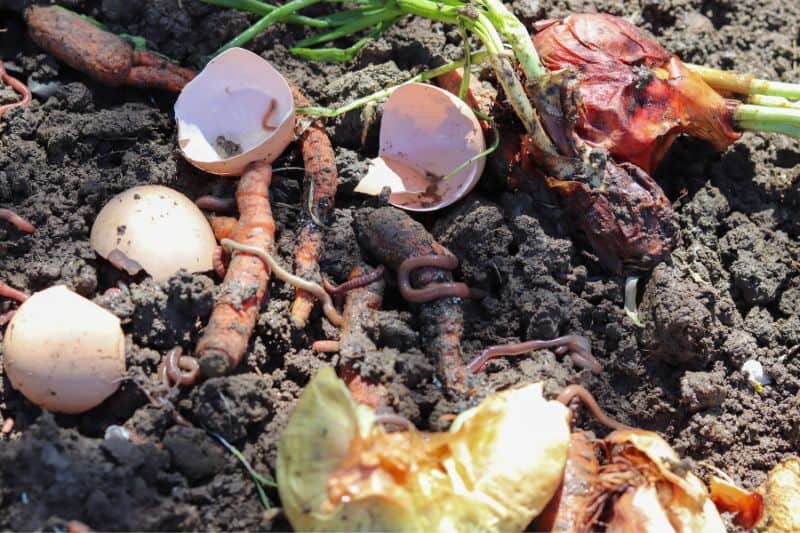
How To Get Rid of Fruit Flies in Compost Pile?
Fruit flies can be annoying, but luckily, there are some simple ways to help reduce their presence in your compost pile. Here are a few suggestions to get rid of them effectively:
1. Turn your compost regularly
By turning your compost pile frequently, you can make it less hospitable for fruit flies. This will help to distribute their food sources and expose their eggs to predators.
2. Bury the food scraps
When you add fruit and vegetable waste to your compost pile, try burying them under a layer of brown materials such as leaves or dried grass clippings. This will make it harder for fruit flies to locate and lay their eggs on the scraps.
3. Use a compost cover
Cover your compost bin with a tight-fitting lid or use a tarp to help keep out unwanted pests. Make sure there is sufficient ventilation to allow air circulation within the bin.
4. Place a trap nearby
Set up a simple homemade fruit fly trap near your compost pile. Fill a small container with apple cider vinegar and a drop of dish soap. The flies will be attracted to the vinegar, and the soap breaks the surface tension, causing them to drown.
5. Maintain a balanced compost
Ensuring your compost pile has the right balance of green and brown material will help to naturally control fruit fly populations. Too much green material can create a moist environment that attracts fruit flies, so add enough brown material to maintain the proper balance.
6. Use Essential Oil
Fruit flies dislike the peppermint odor. Fruit flies cannot enter the compost bin because of the fresh mint’s potent perfume. Basil, lavender, lemongrass, and peppermint all repel fruit flies. These plants will help deter fruit flies from flying near your compost area.
By employing these techniques, you can effectively reduce the presence of fruit flies in your compost pile, making for a more enjoyable composting experience.
Frequently Asked Questions
How can I prevent flies in my compost tumbler?
To prevent flies in your compost tumbler, you can take these simple steps:
1. Make sure to turn the tumbler regularly, which aerates the compost and disrupts the environment flies prefer.
2. Ensure a proper balance of green and brown materials by maintaining a ratio of about 2:1, helping to create the right decomposition conditions.
3. Keep a tight lid on your compost tumbler to prevent flies from entering.
Are flies and maggots harmful to compost?
Flies and maggots play a role in breaking down organic matter in your compost. While they aren’t directly harmful to compost, some people find them unpleasant. Additionally, a large number of flies can indicate an imbalance in the compost. As long as your compost is well-maintained, occasional flies and maggots shouldn’t be a problem.
What are effective ways to deal with fruit flies in compost?
Dealing with fruit flies in your compost can be made easier with these strategies:
1. Keep a layer of brown materials, such as leaves, cardboard, or straw, on top of your compost bin to minimize the visibility and accessibility of fruit scraps.
2. Bury fruit scraps deep within the compost, making them less accessible to flies.
3. Set up traps near the compost bin, such as a cup of vinegar with a drop of dish soap to attract and catch fruit flies.
How can I stop flies in my food waste bin?
To stop flies from infesting your food waste bin, follow these steps:
1. Make sure to always close the bin tightly after each use.
2. Regularly clean the bin using mild detergent and water and a scrub brush to remove any residue.
3. Wrap pungent food waste, like meat or fruit scraps, in newspaper or paper bags before putting it in the bin.
4. Consider using an odor-absorbing material, like a sprinkle of baking soda, at the bottom of the bin to mask odors and dissuade flies from entering.
